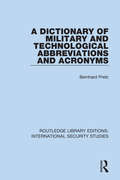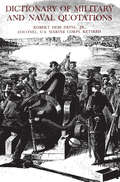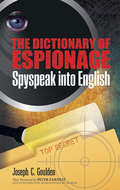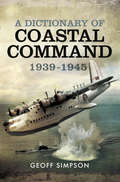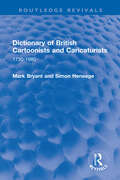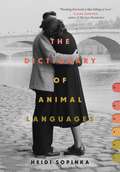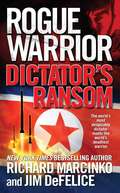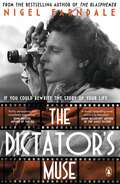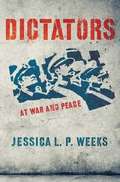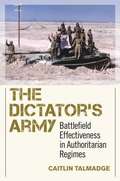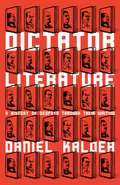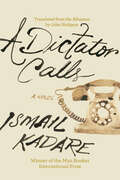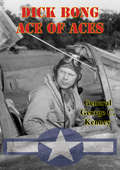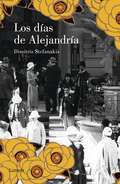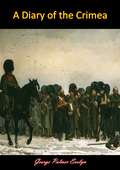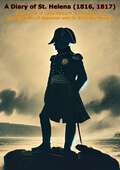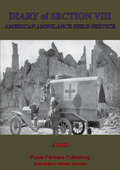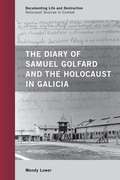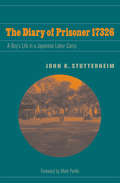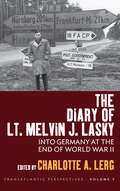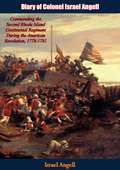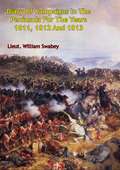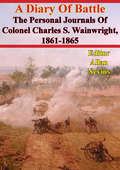- Table View
- List View
A Dictionary of Military and Technological Abbreviations and Acronyms (Routledge Library Editions: International Security Studies #3)
by Bernhard PretzThis book, first published in 1983, is a compilation of some 50,000 acronyms and abbreviations used by the British, American, German and Soviet military. It enables the researcher to understand the language of the Armed Forces, their armaments and the related technology, and to reach a greater understanding of the capabilities and duties of the Armed Forces at the end of the Cold War. The Dictionary covers all the services and their technology, and is an indispensable reference work.
The Dictionary of Military and Naval Quotations
by Robert Heinl Jr.The quotations in this unique dictionary cover all aspects of the military art-war, personalities, traditions and customs, weapons and equipment, as well as virtues and failings. It is a fascinating and comprehensive collection which includes over 5000 quotations and spans the past two thousand years.The words of Catherine the Great are here, along with those of Churchill, Shakespeare, Nimitz, Clausewitz, Kant, and John F. Kennedy. Napoleon I and Thomas Jefferson share a page with Robert E. lee and Alfred Thayer Mahan.The scope of the subject matter covered by the quotations is extensive. The table of rubrics runs between Action to Zeal with 365 pages in between. Aggression, Causes of War, Détente, Duty, Loyalty, Luck, Profanity, Recruits, Victory, Weapons, and Women are but a few of the headings. Quotations under each entry appear in chronological order.Transcending the barriers of the profession of arms, there is much here for the student, the teacher, the historian, the politician, the reference specialist, the public speaker, and the interested reader. The words of hundreds of the world's greatest philosophers, poets, admirals, generals, prophets, and politicians serve both to inspire and to remind us of Santayana's words: "Those who cannot remember the past are condemned to repeat it."
Dictionary of Espionage and Intelligence: Over 800 Phrases Used in International and Covert Espionage
by Bob Burton W. E. GriffinFrom Bob Burton - a former member of both the civilian and military intelligence communities and America’s most feared bounty hunter - comes the complete lexicon of over 800 terms and meanings used in international and covert espionage. Dictionary of Espionage and Intelligence includes the most up-to-date terminology of special operations from A to Z, including: Breaktime: The time it takes to break down he resistance level of a subject in an interrogation of a brutal nature - usually 5-7 hours Hero Project: A project, operation, or extraction considered too dangerous, with only the most skilled personnel able to pull it off. Cake or Death: An unspoken but soon-realized ultimatum that a prisoner of the spook war understands as his personal fate - cooperate or die.Compiled by a man who knows covert action and clandestine warfare from the inside out, Dictionary of Espionage and Intelligence is a perfect compendium of the secret language spoken by those who fight the silent war.
The Dictionary of Espionage: Spyspeak into English (Dover Military History, Weapons, Armor)
by Peter Earnest Joseph GouldenWhat's a black-bag job, a dead-letter drop, a honey trap? Who invented the microdot, and why do they call Green Berets "snake-eaters"? More than just an alphabetical presentation of definitions, this volume offers a fascinating insider's view of the lingo and operations of the CIA, MI5, Mossad, the KGB, and other top-secret organizations.
A Dictionary of Coastal Command, 1939–1945
by Geoff SimpsonAn alphabetical account of the part in the Second World War played by the Kipper Fleet as it was known in the RAF. Coastal Command often lacked resources compared with other home commands, giving it its other nickname of the Cinderella Service. Its main role was defensive that of protecting Britains vital sea borne supply lines in home waters as well as in the Mediterranean, the Middle East and around the coasts of Africa.Coastal Command also acted in an offensive capacity, particularly in the so-called Battle of the Barges in 1940 which helped deter Hitler from invading the UK, and in the Mediterranean and the Baltic, attacking German shipping. Coastal Command, however, is most usually remembered for the war against the U-boats, one that was eventually won.From A to Z this well-illustrated book tells the story of the gallantry, the achievements, the losses, the VCs, the aircraft and much else about RAF Coastal Command.
Dictionary of British Cartoonists and Caricaturists: 1730-1980 (Routledge Revivals)
by Mark Bryant Simon HeneageOriginally published in 1994, this dictionary provides a unique 'who’s who' of the major figures in the world of British cartoons and caricatures. It was the first book to encompass the entire field from c.1730 when Hogarth published the first of his 'modern moral pictures' to 1980. In addition to describing the careers and achievements of the artists and the characteristics of their styles, more than 500 entries give details of their publications, their illustrations to books and periodicals, exhibitions of their work, public collections in which their work is represented and literature on or referring to them. More than 150 illustrations are included. This is a comprehensive reference work and will be of interest to social and political historians as well as cartoon and caricature enthusiasts.
The Dictionary of Animal Languages
by Heidi SopinkaA novel of love, longing, and art set in interwar Paris, The Dictionary of Animal Languages will appeal to readers of All the Light We Cannot See and The Disappeared.Ivory Frame is a renowned artist. Now in her nineties, the famously reclusive painter remains devoted to her work. She has never married, never had a family, never had a child. So when a letter arrives disclosing that she has a granddaughter living in New York, her world is turned upside down and the past is brought painfully to life. Disowned by her bourgeois family, the young Ivory had gone to interwar Paris to study art, and quickly found her true home among the avant-garde painters and poets who crowd the city's cafes. In fellow painter Tacita, she finds the sister she never had. In the Zoological Gardens, she finds a subject for her art capable of fascinating her endlessly. And in Lev, the brooding, haunted Russian émigré painter fleeing the Revolution and destined for greatness, she finds the love that will mark her life forever. But she loses all this, and more, when the Second World War sweeps away the life she has only just discovered. In her grief, she turns to the project she had begun in Paris, and which will consume the rest of her life: a dictionary of animal languages. Part science, part art, the dictionary strives to transcribe the wordless yearning of animals, the lonely and love-laden cries that expect no response. By nature solitary, Ivory withdraws fully into herself as she pursues her life's work. Until the discovery of one of Lev's paintings from 1940, inscribed to Ivory and now worth a fortune, brings to light a secret from her time in Paris that even Ivory could never guess. Now in her nineties, she is forced to acknowledge afresh all she has lost, and also to find meaning and beauty in a world defined by longing. Masterfully written, and emotionally charged, The Dictionary of Animal Languages is about love and grief and art and the realization that, like tragedy, the best things in life arrive out of the blue.
Dictator's Ransom (Rogue Warrior #14)
by Jim Defelice Richard MarcinkoWhen Kim Jong II invites the Rogue Warrior to visit North Korea, Dick Marcinko politely declines, wary of what could be in store for him inside the "Hermit Kingdom." But the CI has other ideas and soon Marcinko is enjoying the comforts of the Supreme Leader's palace--where four nuclear warheads may be hidden. Hot on the radioactive trail in a special op, Marcinko has to stay one step ahead of Kim Jong II--and the Russian mobsters he meets on the way.
The Dictator’s Muse: the captivating novel by the Richard & Judy bestseller
by Nigel Farndale'[A] riveting novel... a fast-paced, brilliantly constructed thriller, in which the fates of the three young British protagonists hang in the balance at the end of every chapter' A. N. Wilson, SPECTATOR'I loved the brash brilliance of this' Peter Bradshaw, Guardian film criticIt is the early 1930s, and Europe is holding its breath. As Hitler's grip on power tightens, preparations are being made for the Berlin Olympics. Leni Riefenstahl is the pioneering, sexually-liberated star film-maker of the Third Reich. She has been chosen by Hitler to capture the Olympics on celluloid but is about to find that even his closest friends have much to fear. Kim Newlands is the English athlete 'sponsored' by the Blackshirts and devoted to his mercurial, socialite girlfriend Connie. He is driven by a desire to win an Olympic gold but to do that he must first pretend to be someone he is not. Alun Pryce is the Welsh communist sent to infiltrate the Blackshirts. When he befriends Kim and Connie, his belief that the end justifies the means will be tested to the core.Through her camera lens and memoirs, Leni is able to manipulate the truth about what happens when their fates collide at the Olympics. But while some scenes from her life end up on the cutting room floor, this does not mean they are lost forever...'Profound and moving... a beautifully written evocation of turbulent times' Daily Express'A novel rich in historical detail, but wearing its research lightly, and the story is told in a French Lieutenant's Woman kind of way, veering from the present to the past with superb flair... this novel has an uncomfortable prescience, with a plot twist at the end which is ingenious. - IRISH INDEPENDENT'A masterly exploration of conflicting loyalties ... Sharply characterised, richly atmospheric and completely engrossing' John Preston, author of The Dig------------------Readers love The Dictator's Muse:***** 'An addictive, all-consuming read'***** 'Flows beautifully with love, hopes, desires and propaganda of the time. Fascinating, engaging and terrifying'***** 'Thoughtful, well researched and atmospheric with engaging characters'***** 'I can't recommend this book highly enough'
Dictators at War and Peace
by Jessica L. WeeksWhy do some autocratic leaders pursue aggressive or expansionist foreign policies, while others are much more cautious in their use of military force? The first book to focus systematically on the foreign policy of different types of authoritarian regimes, Dictators at War and Peace breaks new ground in our understanding of the international behavior of dictators. Jessica L. P. Weeks explains why certain kinds of regimes are less likely to resort to war than others, why some are more likely to win the wars they start, and why some authoritarian leaders face domestic punishment for foreign policy failures whereas others can weather all but the most serious military defeat. Using novel cross-national data, Weeks looks at various nondemocratic regimes, including those of Saddam Hussein and Joseph Stalin; the Argentine junta at the time of the Falklands War, the military government in Japan before and during World War II, and the North Vietnamese communist regime. She finds that the differences in the conflict behavior of distinct kinds of autocracies are as great as those between democracies and dictatorships. Indeed, some types of autocracies are no more belligerent or reckless than democracies, casting doubt on the common view that democracies are more selective about war than autocracies.
The Dictator's Army: Battlefield Effectiveness in Authoritarian Regimes
by Caitlin TalmadgeIn The Dictator's Army, Caitlin Talmadge presents a compelling new argument to help us understand why authoritarian militaries sometimes fight very well--and sometimes very poorly. Talmadge's framework for understanding battlefield effectiveness focuses on four key sets of military organizational practices: promotion patterns, training regimens, command arrangements, and information management. Different regimes face different domestic and international threat environments, leading their militaries to adopt different policies in these key areas of organizational behavior. Authoritarian regimes facing significant coup threats are likely to adopt practices that squander the state's military power, while regimes lacking such threats and possessing ambitious foreign policy goals are likely to adopt the effective practices often associated with democracies. Talmadge shows the importance of threat conditions and military organizational practices for battlefield performance in two paired comparisons of states at war: North and South Vietnam (1963-1975) and Iran and Iraq (1980-1988). Drawing on extensive documentary sources, her analysis demonstrates that threats and practices can vary not only between authoritarian regimes but also within them, either over time or across different military units. The result is a persuasive explanation of otherwise puzzling behavior by authoritarian militaries. The Dictator's Army offers a vital practical tool for those seeking to assess the likely course, costs, and outcomes of future conflicts involving nondemocratic adversaries, allies, or coalition partners.
Dictator Literature: A History of Bad Books by Terrible People
by Daniel KalderA Book of the Year for The Times and the Sunday Times &‘The writer is the engineer of the human soul,&’ claimed Stalin. Although one wonders how many found nourishment in Turkmenbashi&’s Book of the Soul (once required reading for driving tests in Turkmenistan), not to mention Stalin&’s own poetry. Certainly, to be considered great, a dictator must write, and write a lot. Mao had his Little Red Book, Mussolini and Saddam Hussein their romance novels, Kim Jong-il his treatise on the art of film, Hitler his hate-filled tracts. What do these texts reveal about their authors, the worst people imaginable? And how did they shape twentieth-century history? To find out, Daniel Kalder read them all – the badly written and the astonishingly badly written – so that you don&’t have to. This is the untold history of books so terrible they should have been crimes.
A Dictator Calls
by Ismail KadareUsing a sophisticated and literary version of the ever-popular game of telephone to examine the relationship of writers with tyranny, Ismail Kadare reflects on three particular minutes in a long moment of time when the dark shadow of Joseph Stalin passed over the worldIn June 1934, Stalin allegedly called Boris Pasternak and they spoke about the arrest of Osip Mandelstam. A telephone call from the dictator was not something necessarily relished, and in the complicated world of literary politics it would have provided opportunities for potential misunderstanding and profound trouble. But this was a call one could not ignore. Stalin wanted to know what Pasternak thought of the idea that Mandelstam had been arrested.Ismail Kadare explores the afterlife of this phone call using accounts of witnesses, reporters, writers such as Isaiah Berlin and Anna Akhmatova, wives, mistresses, biographers, and even archivists of the KGB. The results offer a meditation on power and political structure, and how literature and authoritarianism construct themselves in plain sight of one another. Kadare&’s reconstruction becomes a gripping mystery, as if true crime is being presented in mosaic.A little time ago the poet Mandelstam was arrested. What have you to say to that, Comrade Pasternak?
Dick Bong: Ace Of Aces
by General George C. KenneyMajor Richard "Dick" Ira Bong died at the tender age of 24 on the 6th August 1945 in a flight accident during testing of the P-80 Shooting Star Fighter. His fame was such that news of his death vied with the atomic bomb attack on Hiroshima in the US press, his legendary exploits at the helm of his P-38 Lightning had made him a household name. Bong had only recently received the Congressional Medal of Honor for his exploits of downing 40 enemy Japanese planes in the Southwestern Pacific. His tally of 40 victories made him the highest scoring American ace of all time, a record that is unlikely to ever be broken.In this biography his former commanding officer General George C. Kenney recounts his life; from his early life in Wisconsin, his sweetheart Marge, and his aerial exploits. Kenney enriches the narrative with personal anecdotes that illuminate the modest unassuming but determinedly heroic, Ace of Aces.Highly recommended.
Los días de Alejandría
by Dimitris StefanakisSaga familiar ambientada en Alejandría durante la primera parte del siglo XX. La novela recurre a la crónica familiar e histórica, al retrato íntimo y a la descripción de lugares, acontecimientos y personajes reales para trazar un mapa detallado de una ciudad donde todo era posible y de una época que ya fue y no volverá.
A Diary of the Crimea: The Story Of War With Russia A Hundred Years Ago
by George Palmer EvelynThis book, first published in 1954, is a fascinating first-hand account by Rifle Brigade officer of the British Army, George Palmer Evelyn, of his experiences during the war in Crimea and on the Danube between 1853-1855. These are conveyed in the form of his diary entries at the time, as well as letters and other related papers dating from 1854-1857 and 1871.Illustrated with official photographs taken during the war.
A Diary of St. Helena (1816, 1817) (1816, 1817) (1816, 1817) (1816, 1817): the Journal of Lady Malcolm:: Containing the Conversations of Napoleon with Sir Pulteney Malcolm
by Clementina E. MalcolmStep into a pivotal moment in history with Clementina E. Malcolm's A Diary of St. Helena (1816, 1817): The Journal of Lady Malcolm. This captivating journal offers a rare and intimate glimpse into the conversations and reflections of Napoleon Bonaparte during his exile on the remote island of St. Helena.Compiled from the meticulous notes of Lady Clementina Malcolm, the wife of Sir Pulteney Malcolm, who commanded the British naval squadron stationed at St. Helena, this diary provides an unparalleled perspective on the daily life and thoughts of the exiled emperor. Lady Malcolm's observations and detailed records of the interactions between Napoleon and her husband, Sir Pulteney Malcolm, reveal the complex character and enduring intellect of one of history's most enigmatic figures.The Diary of St. Helena covers the period from 1816 to 1817, a time when Napoleon was adjusting to his confinement and engaging in profound conversations about his past campaigns, political philosophies, and personal reflections. Through Lady Malcolm's insightful and sensitive portrayal, readers gain access to Napoleon's candid remarks and contemplations, offering a unique window into his mind during his final years.Clementina E. Malcolm's narrative captures the atmosphere of St. Helena, painting a vivid picture of the island's landscape, the daily routines of its inhabitants, and the interactions between the British officials and the French entourage. Her balanced and respectful approach to documenting these encounters ensures that both Napoleon's humanity and his strategic genius are brought to light.Join Clementina E. Malcolm in exploring the intimate and revealing moments of Napoleon's exile, and discover the profound insights contained within A Diary of St. Helena (1816, 1817): The Journal of Lady Malcolm. This diary is a timeless treasure that offers a deeply human perspective on one of history's most storied figures.
Diary Of Section VIII, Of The American Field Ambulance Service
by Anon."As the quick transportation of wounded from the front to the nearest hospital is so great a factor in saving their lives, the American Ambulance Field Service was organized soon after the beginning of the war, and during the subsequent two years its achievement has fully demonstrated the value of its purpose. It has now in the field more than 300 motor ambulances. These are driven by young American volunteers, most of whom are graduates of American universities. To them has been successfully entrusted the vitally important matter of bringing the wounded in the shortest possible time from the trenches to places where the first surgical help can be given. Upon this first surgical help largely depends, naturally, the chance of the wounded surviving long enough to reach the base hospitals. These ambulances are grouped in sections of twenty to thirty cars, and attached to the French Armies. They carry wounded between the front and the Army Hospitals within the Army Zone.The French Army has cited these Sections more than twenty times for distinguished services; has conferred the Croix de Guerre, for bravery, on sixty-six members of the Service, and upon two, the Médaille Militaire, the highest honor for military valor in France."--From the American Ambulance Service Leaflet included in the book.
The Diary of Samuel Golfard and the Holocaust in Galicia
by Wendy LowerThe Diary of Samuel Golfard and the Holocaust in Galicia examines the contents and context of a rare diary written by a Jewish man from Nazi-occupied Poland. Serving as both a record and an artifact of Samuel Golfard’s life, the diary details his attempt to make sense of and resist the event that ultimately destroyed him. Wendy Lower integrates photographs, newspaper articles, documents, and testimonies to create a more complete picture of Golfard’s experiences and writings. She also traces the diary’s own journey after Golfard’s death, from 1943 Poland to the present day.
The Diary of Prisoner 17326: A Boy's Life in a Japanese Labor Camp (World War Ii: The Global, Human, And Ethical Dimension Ser. #20 B/w Illustrations)
by John K. Stutterheim Mark ParilloIn this moving memoir a young man comes of age in an age of violence, brutality, and war. Recounting his experiences during the Japanese occupation of the Dutch East Indies, this account brings to life the shocking day-to-day conditions in a Japanese labor camp and provides an intimate look at the collapse of Dutch colonial rule. As a boy growing up on the island of Java, John Stutterheim spent hours exploring his exotic surroundings, taking walks with his younger brother and dachshund along winding jungle roads. His father, a government accountant, would grumble at the pro-German newspaper and from time to time entertain the family with his singing. It was a fairly typical life for a colonial family in the Dutch East Indies, and a peaceful and happy childhood for young John. But at the age of 14 it would all be irrevocably shattered by the Japanese invasion. With the surrender of Java in 1942, John’s father was taken prisoner. For over three years the family would not know if he was alive or dead. Soon thereafter, John, his younger brother, and his mother were imprisoned. A year later he and his brother were moved to a forced labor camp for boys, where they toiled under the fierce sun while disease and starvation slowly took their toll, all the while suspecting they would soon be killed. Throughout all of these travails, John kept a secret diary hidden in his handmade mattress, and his memories now offer a unique perspective on an often overlooked episode of World War II. What emerges is a compelling story of a young man caught up in the machinations of a global war—struggling to survive in the face of horrible brutality, struggling to care for his disease-wracked brother, and struggling to put his family back together. It is a story that must not be forgotten.
The Diary of Lt. Melvin J. Lasky: Into Germany at the End of World War II (Transatlantic Perspectives #7)
by Charlotte A. LergIn 1945 Melvin J. Lasky, serving in one of the first American divisions that entered Germany after the country’s surrender, began documenting the everyday life of a defeated nation. Travelling widely across both Germany and post-war Europe, Lasky’s diary provides a captivating eye-witness account colored by ongoing socio-political debates and his personal background studying Trotskyism. The Diary of Lt. Melvin J. Lasky reproduces the diary’s vivid language as Lasky describes the ideological tensions between the East and West, as well as including critical essays on subjects ranging from Lasky’s life as a transatlantic intellectual, the role of war historians, and the diary as a literary genre.
The Diary of Lt. Melvin J. Lasky: Into Germany at the End of World War II (Transatlantic Perspectives #7)
by Charlotte A. Lerg"'The Diary of Lt. Melvin J. Lasky' offers not only a panoramic view of a country poised between devastation and an uncertain future but a gripping self-portrait of a man poised between unresolved youthful bewilderment and a mature clarity of conviction." • Wall Street Journal In 1945 Melvin J. Lasky, serving in one of the first American divisions that entered Germany after the country’s surrender, began documenting the everyday life of a defeated nation. Travelling widely across both Germany and post-war Europe, Lasky’s diary provides a captivating eye-witness account colored by ongoing socio-political debates and his personal background studying Trotskyism. The Diary of Lt. Melvin J. Lasky reproduces the diary’s vivid language as Lasky describes the ideological tensions between the East and West, as well as including critical essays on subjects ranging from Lasky’s life as a transatlantic intellectual, the role of war historians, and the diary as a literary genre.
Diary of Colonel Israel Angell: Commanding the Second Rhode Island Continental Regiment During the American Revolution, 1778-1781
by Israel AngellIsrael Angell (August 24, 1740 - May 4, 1832) was a Continental Army officer of the American Revolutionary War.Angell served nearly throughout the entire war in Rhode Island and was successively promoted.He was appointed a major of Colonel Daniel Hitchcock's Regiment at the outbreak of the American Revolution. He served with the regiment in the Siege of Boston. When the Continental Army was reorganized on January 1, 1776, Hitchcock's Regiment was re-designated as the 11th Continental Infantry. Late in 1776, Hitchcock was appointed as a brigade commander and Angell assumed command of the regiment. The regiment was re-designated as the 2nd Rhode Island Regiment on January 1, 1777 and Angell was promoted to lieutenant colonel of the regiment. A few days later, he was promoted to colonel in command of the regiment following the death of Colonel Hitchcock on January 13, 1777.Angell served at Valley Forge in the Winter of 1777 to 1778, and in the following battles:Siege of Boston (1775)Battle of Brandywine (1777)Battle of Red Bank (1777)Battle of Monmouth (1778)Battle of Rhode Island (1778)Battle of Springfield (1780)He was particularly distinguished in the Battle of Springfield, where he withheld a key bridge from British troop advances. He received recognition correspondence for this act of heroism from George Washington and Nathanael Greene. He also served at various places in Rhode Island and New Jersey and along highlands of the Hudson River, most notably at Peekskill and West Point. He retired from the army on January 1, 1781, after the two Rhode Island regiments were consolidated into a single regiment known as the Rhode Island Regiment.—American dictionary of Biography
Diary Of Campaigns In The Peninsula For The Years 1811, 1812 And 1813
by Lieut. William SwabeyLieutenant Swabey's personal diary is a unique account of day-to-day events during the Peninsula War and the epic battles that marked this defiant campaign against Napoleon. The volume also includes Swabey's retrospective reminiscences of the war--an addition of amusing anecdotes which complement the diary. Witnessing the fierce cruelty of the Spaniards, encountering hunger and sickness, Swabey's account takes us from July 1811 to August 1813 when he was invalided home, and includes The Siege of Ciudad Rodrigo, The Siege and Storm of Badajoz, The Battle of Salamanca, The Battle of Vitoria and The Siege of St. Sebastian.
A Diary Of Battle; The Personal Journals Of Colonel Charles S. Wainwright, 1861-1865
by Colonel Charles S. Wainwright Allen NevinsWhen Colonel Charles S. Wainwright (1826-1907), later a brevet brigadier general, was commissioned in the First New York Artillery Regiment of the Army of the Potomac in October 1861, he began a journal. As an officer who fought at Fredericksburg, Chancellorsville, Gettysburg, the Wilderness, Cold Harbor, Spotsylvania, and Petersburg, and who witnessed the leadership of Generals McClellan, Hooker, Burnside, Meade, Grant, and Sheridan, he brilliantly describes his experiences, views, and emotions. But Wainwright's entries go beyond military matters to include his political and social observations. Skillfully edited by Allan Nevins, historian and author of the classic multivolume Ordeal of the Union, this journal is Wainwright's vivid and invaluable gift to posterity.
